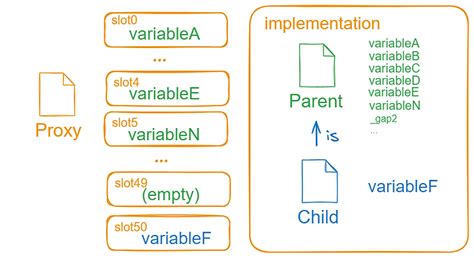I will help you write an article about how the Ethereum proxy contract interacts with storage variables in implementation contracts.
Ethereum Proxy Contract: Understanding Storage Variable Interactions
In the development of Ethereum smart contracts, the proxy contract plays a crucial role in executing operations and interacting with external repositories. One of the key aspects of this interaction is how proxies obtain storage variables from implementation contracts. In this article, we will delve into the details of this process.
Proxy Contract DelegateCall
A proxy contract uses a delegate call to perform operations on behalf of its owner. This approach allows proxies to interact with other smart contracts and repositories without needing to access them directly. When a proxy calls a function in another contract using a delegate-call function, it essentially delegates the execution of that function to the target contract.
Storage Variables in Implementation Contracts
In Ethereum-based implementation contracts (ICs), storage variables are used to store data that can be accessed by other smart contracts or functions during their execution cycle. These variables are typically implemented as constants or variables in the IC and stored on-chain, meaning they are directly on the Ethereum blockchain.
Interactions of Proxy Contract Storage Variables
Let’s now look at how a proxy contract obtains storage variables from an implementation contract. When a proxy calls a function in another contract using a delegate call, it may need access to storage variables defined in that implementation contract. Here’s where things get interesting:
- DelegateCall and Storage Variables: When a proxy executes a function call to another contract, it receives a DelegateCall object as input. This DelegateCall object contains information about the target function, including its memory address, return address, and other details.
- Using Storage Variables

: Using storage variables defined in an implementation contract requires that the proxy contract first obtain a DelegateCall object containing those variables. Once the delegated call is in control, the proxy contract can then manipulate the DelegateCall object to extract the desired information from the target function’s memory.
- Proxy Contract Implementation Details: The implementation details of how the proxy contract uses storage variables from the IC are not public and are considered private information. This means that even developers familiar with Ethereum development cannot directly implement or understand this process without extensive knowledge of smart contract architecture, especially proxy contracts.
- Storage Variable Types: Storage variables in deployment contracts can be of different types (e.g. integer, string, boolean), which allows for different levels of data processing and storage management within the IC. The variable type used by a proxy contract depends on its implementation details.
- Reentrancy Attacks: It is worth noting that the use of storage variables from implementation contracts can introduce reentrancy risks if not handled properly. Reentrancy occurs when a function calls another function, which in turn can call the first function again during the same execution cycle, which can lead to infinite loops or unintended behavior.
Conclusion
In summary, interacting with storage variables defined in Ethereum implementation contracts involves using a delegate call and manipulating the DelegateCall object returned by the target contract function. This process requires a good understanding of smart contract architecture, especially proxy contracts, implementation data, and storage variable types.

